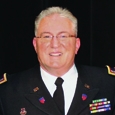
As part of the band class. Mr. Reed had periodic scale exams the students needed to complete. These scales would be used as warmup material during class. Percussionists, in addition to scales, would be responsible for a variety of rudiments used when the brass and woodwinds were playing scales. One percussion student went into a practice room to record his exam. He turned on the recorder, stated his name and that he was playing the Bb concert scale, and proceeded to perform a long roll. After listening to his exam, Mr. Reed talked to him.
Mr. Reed: “You need to realize that what you played was a snare drum rudiment called a long roll. It is what the snare drummers play while the rest of the Band plays the Bb concert scale. Do you understand?”
Student: “Yes.”
Mr. Reed: “What is the name of what you are playing?”
Student: “The long roll.”
The next exam, the student went into the practice room, stated his name and that he was playing the Ab concert scale, and once again played a long roll.
Mr. Reed: “Remember what we talked about after the last scale exam, that you were not actually playing a scale but a rudiment called the long roll. I know it can be confusing because in class we call it the Ab concert scale as that Is what most of the students are playing, but not you. You are playing the long roll. Do you understand?”
The student assured him that he did. and then during the next scale exam played a long roll after announcing he was performing the C concert scale. The next day Mr. Reed stopped him after class and told him, “Your scales are really getting better.”
Learning Someone Else’s Hard Lesson
One night at his first teaching position, Mr. Reed was working late. As he walked down to the photocopier, he noticed some figures in the dark. Upon further investigation, it was the principal and two parents who looked like they were waiting for someone. Returning with his copies, he saw that a bus had parked in front of the school, and students were unloading. He then remembered that another teacher had taken a group of students on a field trip that day. As he was walking by, Mr. Reed heard an angry confrontation from the parents. The teacher did not take proper accountability and had left one of his students behind. This was before the age of cell phones, so there was no way to contact the director on the bus. He had to find someone who would let him use a telephone to call long distance to his parents. The parents and principal demanded that the teacher take his own vehicle and drive the four-hour round trip to retrieve the student and bring him home. Mr. Reed never forgot this incident, and for his entire career he was meticulous in his accountability of all students, often assigning seats on long trips for easier monitoring.
After-School Commitment
The students in Mr. Reed’s varsity jazz band asked to have a meeting with him. They explained that they were tired of having their rehearsals early in the morning and wanted them after school. When Mr. Reed asked them about sports conflicts after school, all of the students agreed they would not join a sports team if it conflicted with jazz band rehearsal. This went fine for several months until the spring sports season. The school was starting a soccer team, and several jazz band students wanted to play.
When Mr. Reed reminded the students of their pledge to the jazz band, they said they really wanted to play and would try to find a way to make it work. Disappointed but realistic, he told the students he would talk to the soccer coach and see if something could be worked out. When meeting with the soccer coach, Mr. Reed said that he could live with the students leaving jazz band early each day to make it to soccer late, or they could alternate days between soccer and jazz band. The soccer coach blatantly refused, saying if he could not have them for the entire time, every day, he didn’t want them at all. Mr. Reed went back to his office planning what to do next, as he more than likely would be losing six members of his varsity jazz band.
After school, Mr. Reed was surprised to see all the members of his jazz band at rehearsal. When he asked the potential soccer players about the situation, a spokesman said, “When we saw that you were willing to work with us to let us do both things and the coach wasn’t, we realized we needed to be with you. We’re not going out for soccer.”
Mr. Reed thought the incident was over, but the next day Mr. Reed was called into a meeting with the principal, activities director, and soccer coach. After the situation was discussed, Mr. Reed was told that there would be no band practices of any kind after school, as it interfered with athletics. Future band rehearsals were limited to before school only. However, the six students the coach badly wanted never did join the soccer team.






